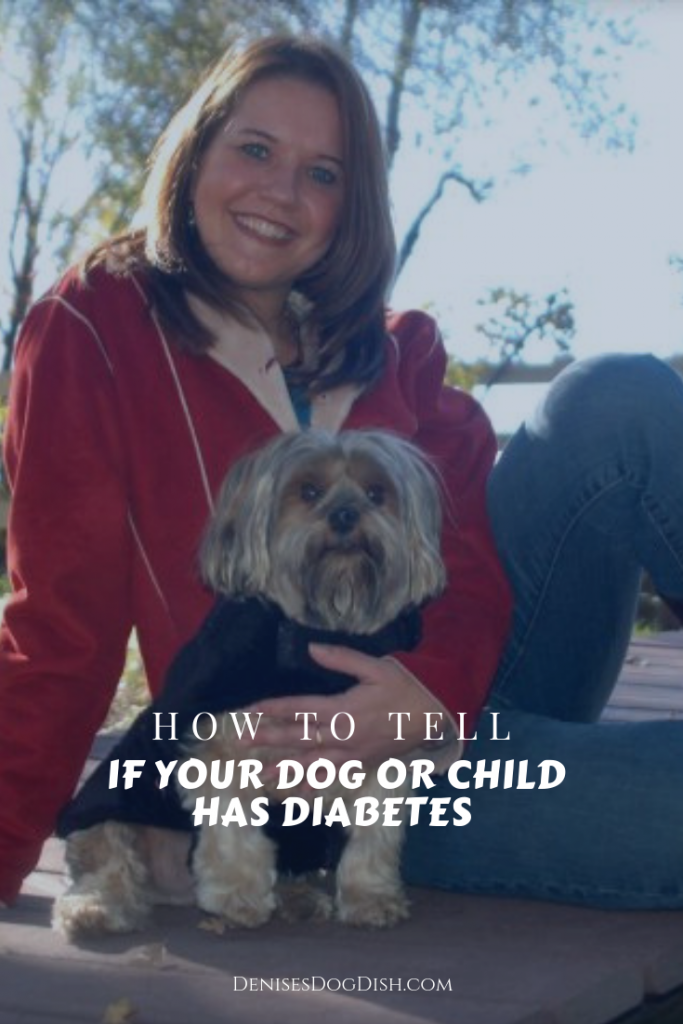Diabetes-Signs & Symptoms
Special Needs Pets have a special place in our hearts. Today’s topic deals with a question I’ve been asked many times, “How do I tell if my child or dog has Diabetes?”. Did you know the signs and symptoms of diabetes are the same for children & dogs? Signs and symptoms of Diabetes for all ages are the same but children and dogs are often (as children) or not at all (as dogs) able to tell us what they are feeling and/or symptoms they are experiencing.
Flashback to 2010
Since writing Harley’s Story, a children’s book where Harley tells his story of adoption and being diagnosed with Diabetes (reviews), I have heard the same question over and over. How do I know if my child or dog has diabetes?
I fully understand fearing you will miss the signs and symptoms of diabetes. Either for your child and/or your furry family member.
In late 2010 I called our vet and asked, “Harley is peeing more frequently, having potting accidents despite being potty-trained, and drinking more water. In humans (I’m a Family Nurse Practitioner) that is diabetes what is that in a dog”. The Vet answered, “diabetes, bring him in”. His blood sugar was in the 400’s where normal, for pets and humans, is around 120.
I was devastated. What did this mean for my furkid? After blood tests demonstrated his kidneys, heart, and liver were looking good the Vet reassured me. We caught it since I know the signs and symptoms and called early. As it turns out, a lot of people are not able to identify the signs and symptoms and catch them too late.
It took several months, I had a lot to learn-insulin injections, blood glucose monitoring, and “How to Choose a Dog Food” to name a few but we were able to get his glucose levels under control. I’ll talk about managing diabetes in additional posts.
Know the signs and symptoms & catch diabetes early:
- Excessive thirst
- Excessive hunger/change in appetite
- Excessive urination
- Fatigue
- Weight loss
- Blurred vision
- Slow healing of sores or cuts
- Frequent urinary tract infections
Helping prevent diabetes:
- Maintaining weight
- Healthy diet
- Exercise
 How do you talk to your child about their newly diagnosed illness? How do you tell your child their pet has an illness like diabetes? What can you do to explain that they will be loved unconditionally regardless of health issues? The answer is “Harley’s Story”.
How do you talk to your child about their newly diagnosed illness? How do you tell your child their pet has an illness like diabetes? What can you do to explain that they will be loved unconditionally regardless of health issues? The answer is “Harley’s Story”.
GET YOUR COPY!
HELPFUL LINKS (where we sniffed out our information & you can get more)





Great tips! I don’t have experience with diabetes in dogs or people, but it’s helpful to know what to look for. In cats, these symptoms also can be thyroid related.
See you soon in Phoenix!
I don’t know a lot about the cat part of Diabetes but I’ve heard they can sometimes be treated with pills (I’ll have to research it a bit and put it in the second post on treatment). Symptoms of Endocrine disorders have so much overlap! Shasta has Cushing’s Disease, I thought he had Diabetes with his excessive drinking of water and peeing, but it turned out to be Cushing’s which is a disorder of the Adrenal glands where he gets extra Cortisol (I wrote about it early on https://denisegruzensky.com/and-shastas-diagnosis-is/). I’ll have to evergreen that post when I learn how. 😉
Our vet thought our first dog, Pip, had Cushing’s, but after tests it was determined he didn’t.
As a newly diagnosed diabetic myself, this is great info and a great checklist for my pets. I have a sister in law who has a cat that was recently diagnosed — scary that human diseases are impacting our pets.
Wow Robbi, I’m so glad you’ll be able to use the information and hope your new diagnosis and treatment plan are coming together! As well as for your sister in law’s cat. I truly believe our diets are really impacting both human and pet health! Of course genetics play a role as well. 😉
Thank you for this important information. We don’t always associate the same symptoms in humans and pets. One of my cats starting eating excessively more, and she was never a big eater, but she was loosing weight instead of gaining it. Turns out she is hyperthyroid and is now on medication, which is thankfully making her feel much better and getting her levels under control.
That is amazing and again some of the same symptoms humans report. I’m glad she is feeling better!
Glad you were able to get his levels under control!
Us too, it took a lot of work and attention but was worth it!
I am forwarding this to my friend who has both a daughter and a dog with diabetes. She’s also a nurse and will appreciate this post.
Thank you! I’d love to hear what she thinks. I’m sure having their furry family have the same diagnosis reminds their daughter she is not alone.
Great post, and good to educate readers. Diabetic cats rarely do well with pills. They often do VERY well on a high protein/low carb diet, though, and can sometimes get off insulin indefinitely. Drinking lots of water/excessive urination also is a sign of renal insufficiency in kitties (very common in the old ones), but with dogs–as you say–mostly that points to diabetes. Oh, and I know a young girl diagnosed with juvenile diabetes (now getting ready to graduate college) who has a diabetes-alert dog!
I didn’t realize cats rarely do well with pills and here I’ve been jealous that they could be treated that way. I’m pretty sure I know more about dog nutrition than people’s, surprising considering I’m a Nurse Practitioner for people….. BOL I LOVE that she has a diabetic alert dog. I think all of that is so amazing!
Interesting about excessive thirst! Not a symptom I would think to look out for. Will be monitoring Kilo’s water intake more closely from now on! So glad you were able to get Harley’s glucose levels on track, they deserve the world!
They really do! I feel so blessed to have them in our lives and am willing to give them the world!
This is such important information for parents (of pets as well as children). Thank you for sharing – I will be happy to pin.
Thank you! If the information helps even 1! I’ll create an infographic sometime soon as well. 😉
My daughter’s dog died with diabetes. I wish we would have had these tips back then. By the time, she got him to the vet he was not in a good way 🙁
Oh I’m so very sorry! Losing a furry family member is heartbreaking! I’m planning to make an infographic so we can share the information even more!
I’ve had several cats diagnosed with hyperthyroid and/or early onset kidney failure (they’ve all lived to 17+ years). Each time the symptoms came on, there was always a concern it could be diabetes, too. I’ve never had a pet with diabetes, yet, and hope I don’t ever. 🙁 Type 2 diabetes runs on my family, so my children and I will need to be vigilant watchers.
Glad Harley is OK now! Scary stuff!
The good news is they can live long happy lives with Diabetes, when it is caught early. So I’m hoping the information can help. Even if it helps just on! 🙂
Interesting that symptoms are the same for kids & dogs. Thanks for sharing!
Love & biscuits,
Dogs Luv Us and We Luv Them
I find it fascinating how much of what I know about humans applies to our furry family members as well!
I’m looking forward to reading this series., I know cats can have diabetes, too, but I don’t have any experience with it.
I’ll discuss cats more during the treatment since their treatment options are greater than that for dogs.
I do remember hearing that somewhere. I watch Mr. N’s water consumption levels and his bathroom habits just in case.
When we first rescued Shasta I was really worried about how much water he drank but it turned out it was just him….. of course 2 years later all that changed with his diagnosis of Cushing’s but I was still paying close attention so we caught it early again… 😉
I didn’t realize the same symptoms would present in dogs and humans, but it makes perfect sense. With dogs and kids you have to look out for abnormalities since they often can’t tell you what is going on. Thanks for sharing this information!
Special needs pets has definitely become a passion of mine and I’m continuously surprised by how many similarities there are between human and pet health!
Such good info to know. I don’t know anything about canine diabetes. I didn’t realize the symptoms are the same for dogs and children.
I’m so glad the information is helpful! I’m going to need to add more about Diabetes in this series.
wow, I honestly didn’t realize that the symptoms for both dogs and children would be the same! Thanks so much for sharing this information…it’s really helpful!
I’ve been really surprised, the more time I spend learning about pets special needs, how much overlap there is!
It’a hard for a child or animal to have diabetes. I hope all goes well with both and thanks for the information.
I think these are super key: sometimes folks dismiss excessive thirst and drinking especially when they only see it happen when they’re home from work. It’s really tough so awareness around this is key. I know when my dogs are on steroids, it’s so obvious they’re urinating more so I’ve seen when this behavior is like in my guys… great post.
Thanks Christine! I’m hoping to get the information out there so people can catch it early!
Thank you for this. My dog has been sick for quite some time, and it was really annoying not knowing what was wrong with him. Your tips really helped out a lot.
I’m so glad this was helpful! Please keep me posted on your furry family member’s progress!
I have 2 kids ages 10 and 15. My son has been a Type 1 Diabetic since the age of 6. From diagnosis, we have been encouraging him and telling him that he is no different than any other kid. At age 8 he started playing baseball and practicing for summer track throwing shot put at the same time. He and his older sister made regionals in track that year, both in shot.
Since then they have both added javelin to their summer track program, and she added discus. They have competed at not only regionals, but nationals as well. My daughter also plays volleyball in the fall while my son plays football. They both do curling in the winter. Come Spring my daughter starts track and we start gearing up for summer track and practicing.
This year will be our first year flying not only with a diabetic, but the first time ever, as they will both be competeing at the ESPN Wide World of Sports Complex at Club Nationals.
Traveling with a diabetic athlete has been tricky! It’s hard to narrow down just one thing we have learned to not travel without aside from his supplies, but one item is the Frogg type chill towels. It helps keep both athletes cool and also helps keep the insulin from spoiling in the heat (we pack everything in coolers). We carry around 4 towels at least to switch out as needed. We also pack plenty of Gatorade and water to keep everyone hydrated.
What an amazing gift you’ve given your children. The education and support to help them fulfill their dreams. Both of their accomplishments are an inspiration! Thank you so much for sharing!
Thanks for making this known! Good to know that you can recognize it in dogs the same way in people. I hope most people know to pay attention to their dogs. I would think there would be certain dog foods to stay away from.
There are and it took us a while to find the right one for Harley. There is a post planned… 😊